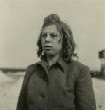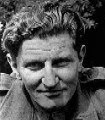simple really, a line from Tayeb Salih's Season of Migration to the North:
"All of us, my son, are in the last resort travelling alone,"
in the section copied below, and remembered because of Salih's trick of saving what the priest said for a few pages before revealing it, arguments on this subject many years ago with a friend now dead ... and having stumbled over Chris Simpson's images from Madagascar a few weeks ago, and today finding George Rodger's photograph of Bergen-Belsen ... not complicated



Tayeb Salih, Season of Migration to the North:
I remember that in the train I sat opposite a man wearing clerical garb and with a large golden cross round his neck. The man smiled at me and spoke in English, in which I answered. I remember well that amazement expressed itself on his face, his eyes opening wide directly he heard my voice. He examined my face closely, then said: "How old are you?" I told him I was fifteen, though actually I was twelve, but I was afraid he might not take me seriously. "Where are you going?" said the man. "Fm going to a secondary school in Cairo." "Alone?" he said. "Yes," I said. Again he gave me a long searching look. Before he spoke I said, "I like travelling alone. What's there to be afraid of?" At this he uttered a sentence to which at the time I did not pay much attention. Then, with a large smile lighting up his face, he said: "You speak English with astonishing fluency."
'When I arrived in Cairo I found Mr Robinson and his wife awaiting me, Mr Stockwell (the head-master in Khartoum) having informed them I was coming. The man shook me by the hand and said, "How are you, Mr Sa'eed?" "Very well thank you, Mr Robinson," I told him. Then the man introduced me to his wife, and all of a sudden I felt the woman's arms embracing me and her lips on my cheek. At that moment, as I stood on the station platform amidst a welter of sounds and sensations, with the woman's arms round my neck, her mouth on my cheek, the smell of her body - a strange, European smell - tickling my nose, her breast touching my chest, I felt - I, a boy of twelve - a vague sexual yearning I had never previously experienced. I felt as though Cairo, that large mountain to which my camel had carried me, was a European woman just like Mrs Robinson, its arms embracing me, its perfume and the odour of its body filling my nostrils. In my mind her eyes were the colour of Cairo: grey-green, turning at night to a twinkling like that of a firefly. "Mr Sa'eed, you're a person quite devoid of a sense of fun," Mrs Robinson used to say to me and it was true that I never used to laugh. "Can't you ever forget your intellect?" she would say, laughing, and on the day they sentenced me at the Old Bailey to seven years' imprisonment, I found no bosom except hers on which to rest my head. "Don't cry, dear child," she had said to me, patting my head. They had no children. Mr Robinson knew Arabic well and was interested in Islamic thought and architecture, and it was with them that I visited Cairo's mosques, its museums and antiquities. The district of Cairo they loved best was al-Azhar. When our feet wearied of walking about we'd take ourselves off to a café close by the al-Azhar Mosque where we would drink tamarind juice and Mr Robinson would recite the poetry of al-Ma'arri. At that time I was wrapped up in myself and paid no attention to the love they showered on me. Mrs Robinson was a buxom woman and with a bronze complexion that harmonized with Cairo, as though she were a picture tastefully chosen to go with the colour of the walls in a room. I would look at the hair of her armpits and would have a sensation of panic. Perhaps she knew I desired her. But she was sweet, the sweetest woman I've known; she used to laugh gaily and was as tender to me as a mother to her own son.
'They were on the quayside when the ship set sail with me from Alexandria. I saw her far-away waving to me with her handkerchief, then drying her tears with it, her husband at her side, his hands on his hips; even at that distance I could almost see the limpid blueness of his eyes. However I was not sad. My sole concern was to reach London, another mountain, larger than Cairo, where I knew not how many nights I would stay. Though I was then fifteen, I looked nearer twenty, for I was as taut and firm-looking as an inflated waterskin. Behind me was a story of spectacular success at school, my sole weapon being that sharp knife inside my skull, while within my breast was a hard, cold feeling - as if it had been cast in rock. And when the sea swallowed up the shore and the waves heaved under the ship and the blue horizon encircled us, I immediately felt an overwhelming intimacy with the sea. I knew this green, infinite giant, as though it were roving back and forth within my ribs. The whole of the journey I savoured that feeling of being nowhere, alone, before and behind me either eternity or nothingness. The surface of the sea when calm is another mirage, ever changing and shifting, like the mask on my mother's face. Here, too, was a desert laid out in blue-green, calling me, calling me. The mysterious call led me to the coast of Dover, to London and tragedy.
'Later I followed the same road on my return, asking myself during the whole journey whether it would have been possible to have avoided any of what happened. The string of the bow is drawn taut and the arrow must needs shoot forth. I look to right and left, at the dark greenness, at the Saxon villages standing on the fringes of hills. The red roofs of houses vaulted like the backs of cows. A transparent veil of mist is spread above the valleys. What a great amount of water there is here, how vast the greenness! And ali those colours! The smell of the place is strange, like that of Mrs Robinson's body. The sounds have a crisp impact on the ear, like the rustle of birds' wings. This is an ordered world; its houses, fields, and trees are ranged in accordance with a plan. The streams too do not follow a zigzag course but flow between artificial banks. The train stops at a station for a few minutes; hurriedly people get off, hurriedly others get on, then the train moves off again. No fuss.
'I thought of my life in Cairo. Nothing untoward had occurred. My knowledge had increased and several minor incidents had happened to me; a fellow student had fallen ín love with me and had then hated me. "You're not a human being," she had said to me. "You're a heartless machine." I had loafed around the streets of Cairo, visited the opera, gone to the theatre, and once I had swum across the Nile. Nothing whatsoever had happened except that the waterskin had distended further, the bowstring had become more taut. The arrow will shoot forth towards other unknown horizons.
'I looked at the smoke from the engine vanishing to where it is dispersed by the wind and merges into the veil of mist spread across the valleys. Falling into a short sleep, I dreamt I was praying alone at the Citadel Mosque. It was illuminated with thousands of chandeliers, and the red marble glowed as I prayed alone. When I woke up there was the smell of incense in my nose and I found that the train was approaching London. Cairo was a city of laughter, just as Mrs Robinson was a woman of laughter. She had wanted me to call her by her first name - Elizabeth - but I always used to call her by her married name. From her I learnt to love Bach's music, Keats's poetry, and from her I heard for the first time of Mark Twain. And yet I enjoyed nothing. Mrs Robinson would laugh and say to me, "Can't you ever forget your intellect?" Would it have been possible to have avoided any of what happened? At that time I was on the way back. I remembered what the priest had said to me when I was on my way to Cairo: "All of us, my son, are in the last resort travelling alone." He was fingering the cross on his chest and his face lit up in a big smile as he added: "You speak English with astonishing fluency." The language, though, which I now heard for the first time is not like the language I had learnt at school. These are living voices and have another ring. My mind was like a keen knife. But the language is not my language; I had learnt to be eloquent in it through perseverance. And the train carried me to Victoria Station and to the world of Jean Morris.
(from Lynne Rienner Publishers' 1997 edition translated by Denys Johnson-Davies, starting on page 24, to page 29)
it goes on of course, if you look carefully at Rodger's picture you see the calculating squint of the boy, and then maybe notice the two other people walking behind him on the road ...






why he should have focussed on female SS guards? if he did indeed or if it is just an accident of editors & time? but he wanted no more or war and spent years with his wife Jinx in Africa, as an antidote? as a consolation? I have no idea
what’s in a face? from Patrick Cahill's blog.










No comments:
Post a Comment